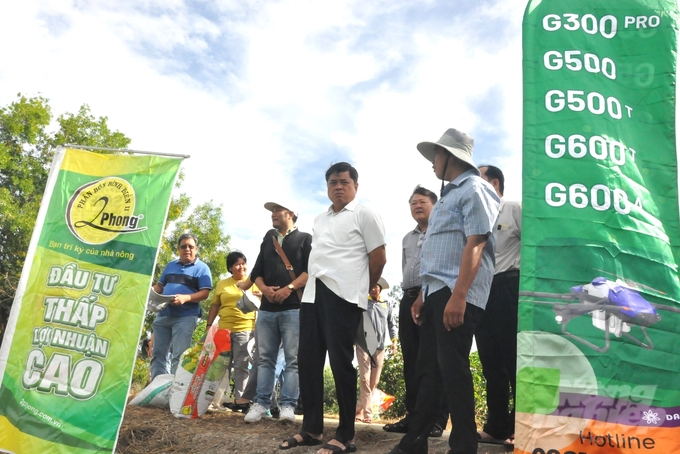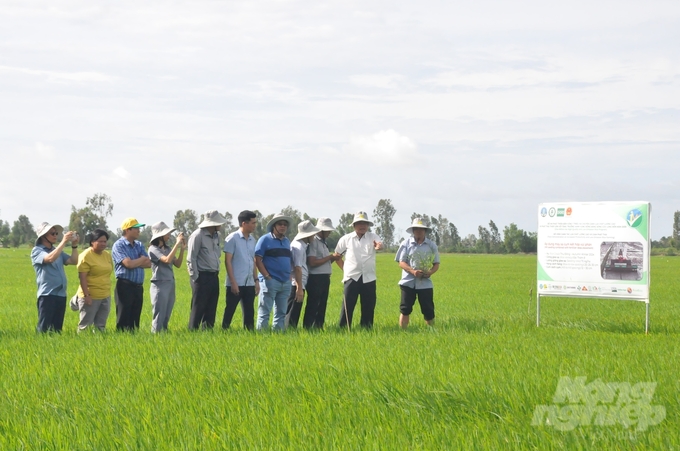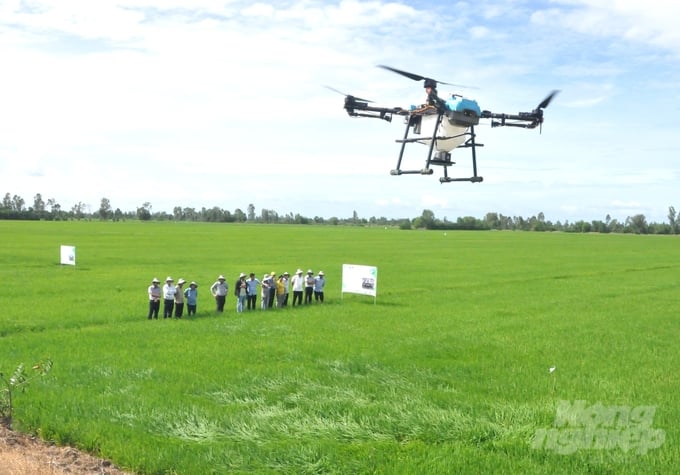May 22, 2025 | 09:52 GMT +7
May 22, 2025 | 09:52 GMT +7
Hotline: 0913.378.918
May 22, 2025 | 09:52 GMT +7
Hotline: 0913.378.918
On August 39, MARD Deputy Minister Tran Thanh Nam led a working group of the Ministry to survey the models within the Project on 1 million ha of high-quality, low-emission rice attaching to green growth in the Mekong Delta (the Project) in Thanh nien Phu Hoa Agricultural Service Cooperative in Tan Hoi commune, Tan Hiep, Kien Giang province (the Project).

Deputy Minister of Agriculture and Rural Development Tran Thanh Nam and the working delegation surveyed the pilot model participating in the Project of 1 million hectares of high-quality, low-emission rice at Phu Hoa Youth Agricultural Service Cooperative. Photo: Trung Chanh.
Mr. Nguyen Van Huynh, the director of Than nien Phu Hoa Agricultural Service Cooperative disclosed that the cooperative has 320 members and a production area of 613ha. In the autumn-winter rice of 2024, the unit was chosen to participate in the project as a model with a 50ha area and 25 producers. The model employs three sowing methods, including line sowing, cluster sowing, and drone sowing, with a seed quantity of 70kg/ha, which is 30kg/ha less than that of the control field. The rice variety used for sowing is Dai Thom 8.
This is also the field that employs synchronous mechanization in rice production, with the support of nine units in terms of materials and mechanized equipment. The rice has grown well during the 45 days from the middle of July to the present, ensuring a high density of blooms per unit area. The alternative wet and dry management process, which utilizes water level sensor tube technology, is implemented in the model's field.

The 50-hectare field at Thanh Nien Phu Hoa Agricultural Service Cooperative is a model for the launch of the 1 million hectares of high-quality, low-emission rice project in Kien Giang. Photo: Trung Chanh.
The Thanh An Shrimp-Crab-Rice Cooperative, situated in Dong Thanh commune, An Minh district, Kien Giang, has been chosen to partake in a development project model. This September, they are preparing to cultivate rice on shrimp farming land, which spans nearly 11 hectares. Subsequently, the Kien Giang Department of Agriculture and Rural Development will extend the model to 10 additional districts and communities within the province for the 2024 rice season and the 2024-2025 winter-spring season. In particular, the districts of Giong Rieng, Chau Thanh, GO Quao, Hong Dat, Kien Luong, Giang Thanh, and Rach Gia City will each cover 50 hectares. For the 2024 season, each of the remaining three districts in the U Minh Thuong region—An Bien, U Minh Thuong, and Vinh Thuan—will be allocated 10 hectares.
Therefore, the project will involve a total of 12 out of 15 districts and cities in Kien Giang. The project will also include 8 pilot models in intensive rice cultivation areas, each with a scale of 50 hectares, and 8 organic rice-ecological shrimp models in rice-shrimp rotation areas, each with a scale of 10 hectares. The total planting area in these prototype models will be 440 hectares.
Kien Giang province will conduct 120 training sessions for farmers in the Mekong Delta, both within and outside the model areas, to provide technical assistance. These sessions will focus on the development of high-quality, low-emission rice production techniques following the guidelines established by the Department of Crop Production. The Kien Giang Provincial People's Committee has also resolved to allocate nearly 5.8 billion VND in financing to the Department of Agriculture and Rural Development for the project's implementation throughout the province.

The pilot model at Phu Hoa Thanh nien Agricultural Service Cooperative applies synchronous mechanization in rice production with the participation of supporting units in terms of materials and mechanization equipment. Photo: Trung Chanh.
According to Deputy Minister Tran Thanh Nam, the rice fields at the Phu Hoa Thanh nien Agricultural Services Cooperative within the model had effectively implemented the high-quality, low-emission rice cultivation procedure for the Mekong Delta region, as specified by the Department of Crop Production. This signifies a substantial early success and is indicative of the farmers' dedication to the effort.
Deputy Minister Tran Thanh Nam observed that the project has resulted in a favorable change in rice production by utilizing technological advancements to reduce investment costs and production expenses. It is anticipated that the autumn-winter rice crop will produce 5 tons per hectare, with a price of 9,000 VND per kilogram. This will enable farmers to generate a revenue of 45 million VND per hectare, while the cost is only approximately 12 million VND per hectare. Consequently, the ideal profit is 33 million VND per hectare.

Deputy Minister of Agriculture and Rural Development Tran Thanh Nam requested the agricultural sector of localities participating in the Project to increase training for community agricultural extension forces to participate in the Project. Photo: Trung Chanh.
He encouraged the Phu Hoa Thanh nien Agricultural Services Cooperative members to persist in the application of the transmitted techniques, with the objective of achieving sustainable and effective rice production. The model will establish a linkage mechanism between rice production and consumption, ensuring that high-quality inputs are available at reasonable prices. It will employ technical processes to reduce costs, increase profits, and ensure that reasonable prices are charged for outputs. Profits will be shared within the rice value chain.
"Effective irrigation and drainage management is a prerequisite for reducing emissions in rice cultivation. This necessitates the implementation of on-farm irrigation systems that guarantee expeditious drainage and an adequate water supply. The agricultural sectors in the provinces implementing the project need to strengthen training for community agricultural extension workers involved in the project and transfer technical procedures to expand the model to other localities, ensuring that the project area targets are met according to the set timeline," Deputy Minister Tran Thanh Nam underscored.
Translated by Linh Linh
![Reducing emissions from rice fields: [2] Farmers’ commitment to the soil](https://t.ex-cdn.com/nongnghiepmoitruong.vn/608w/files/news/2025/05/05/dsc08881jpg-nongnghiep-140632.jpg)
(VAN) Clean rice cultivation model in Thuong Tan commune, Bac Tan Uyen district, is assisting local residents in achieving sustainable agriculture by substantially reducing costs, increasing productivity, and protecting the environment.

(VAN) At the conference to disseminate Resolution No. 68, AgriS introduced its digital agricultural ecosystem and reaffirmed its commitment to accompanying the Government in promoting private sector development and sustainable agriculture.

(VAN) 'Blue Ocean - Blue Foods' initiative is designed to restore marine ecosystems and establish sustainable livelihoods for local communities by cultivating a minimum of 1,000 hectares of cottonii seaweed in the first three years.
/2025/05/21/4642-3-112707_603.jpg)
(VAN) The V-SCOPE project has made direct contributions to three out of six pillars of the Comprehensive Strategic Partnership between Vietnam and Australia.

(VAN) Facing the threat of rabies spreading to the community, Gia Lai province urgently carries out measures to vaccinate dogs and cats on a large scale.

(VAN) Disease-free livestock farming not only protects livestock herds but also stabilizes production and livelihoods for many farmers in Tuyen Quang.

(VAN) Japan's grant aid project contributes to capacity building, promoting organic agricultural production, and fostering sustainable community development in Dong Thap province.